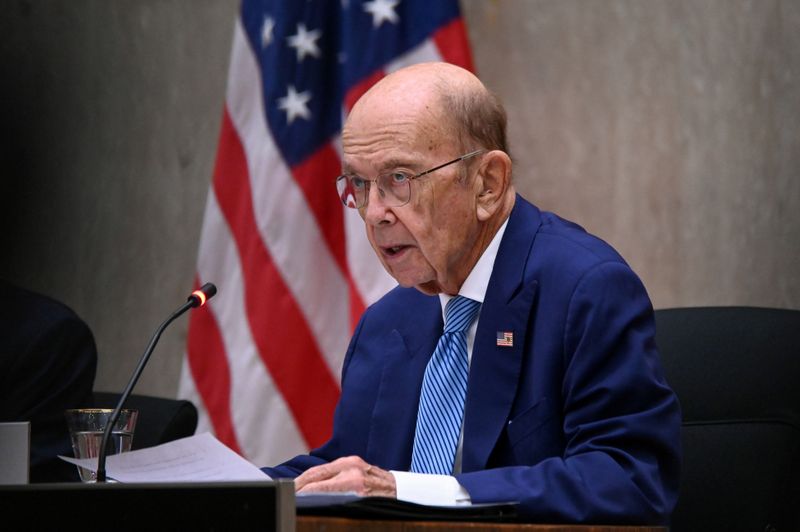By Mike Stone, Alexandra Alper and David Brunnstrom
WASHINGTON (Reuters) - The Trump administration in its waning days took another swipe at China and its biggest firms on Thursday, imposing sanctions on officials and companies for alleged misdeeds in the South China Sea and imposing an investment ban on nine more firms.
The moves will further increase tensions with China, Washington's strategic rival in Asia, days before President-elect Joe Biden takes office on Wednesday. The Biden transition team did not immediately respond to a request for comment.
Executives of state-owned enterprises, officials of the Chinese Communist Party and military, along with oil giant CNOOC (NYSE:CEO) will face new restrictions for allegedly using coercion against states with rival South China Sea claims.
Senior U.S. officials told reporters on a call Thursday the new CNOOC restrictions will not apply to crude, refined fuels and liquid natural gas and do not apply to existing joint ventures with CNOOC that do not operate in the South China Sea.
Nine Chinese firms were added to the Pentagon's list of companies with alleged ties to the Chinese military, including planemaker Comac and phone maker Xiaomi (OTC:XIACF) Corp.
Those companies will be subject to a new U.S. investment ban which forces American investors to divest holdings of the blacklisted firms by Nov. 11, 2021.
In its response, the Chinese embassy referred to Jan. 7 Foreign Ministry comments accusing Washington of "pinning political and ideological labels on economic and trade issues and exploiting its state power to crack down on foreign companies, under the pretext of national security."
The United States has long opposed China's extensive territorial claims in the South China Sea, a potentially resource-rich area that is also a strategic trade route. Washington accuses Beijing of intimidating states such as Vietnam and the Philippines that have competing claims there.
China accuses Washington of trying to destabilize the region by sending warships and planes to the South China Sea.
"The United States stands with Southeast Asian claimant states seeking to defend their sovereign rights and interests, consistent with international law," Secretary of State Mike Pompeo said in announcing the sanctions.
Pompeo said Washington was imposing visa restrictions on executives of Chinese state-owned enterprises and officials of the Chinese Communist Party and navy.
He said the sanctions were directed against those "responsible for, or complicit in, either the large-scale reclamation, construction, or militarization of disputed outposts in the South China Sea, or use of coercion against Southeast Asian claimants to inhibit their access to offshore resources."
The restrictions could also apply to immediate family members, he said.
The Commerce Department accused CNOOC of harassing and threatening offshore oil and gas exploration and extraction in the South China Sea, "with the goal of driving up the political risk for interested foreign partners, including Vietnam."
President Donald Trump's administration has kept up pressure in its final days, targeting what Washington sees as Beijing's bid to use corporations as a means to harness civilian technologies for military purposes.
Commerce Secretary Wilbur Ross said CNOOC acted as "a bully for the People’s Liberation Army to intimidate China's neighbors" and the Chinese military "continues to benefit from government civil-military fusion policies for malign purposes."
Ross's department added CNOOC to an "Entity List" that requires firms to be granted a special license before they can receive exports of high-tech items from U.S. suppliers.
Chinese aviation firm Skyrizon was added to a Military End-User (MEU) List over its ability to develop military products including aircraft engines, restricting its access to U.S. exports.
Aside from Comac and Xiaomi, the Pentagon added Advanced Micro-Fabrication Equipment Inc, Luokung Technology Corp, Beijing Zhongguancun Development Investment Center, GOWIN Semiconductor Corp, Grand China Air Co Ltd, Global Tone Communication Technology Co Ltd and China National Aviation Holding Co Ltd to the list.
Representatives of the Chinese firms did not immediately respond to requests for comment.

On Wednesday the Trump administration scrapped plans to blacklist Chinese tech giants Alibaba (NYSE:BABA), Tencent and Baidu (NASDAQ:BIDU), four people familiar with the matter said.